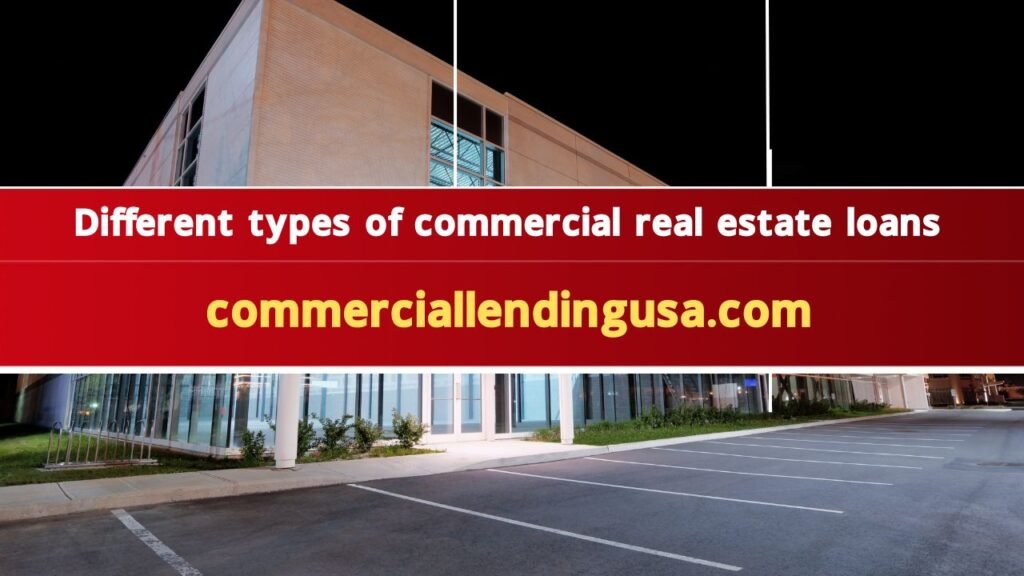Commercial real estate loans is a property that is used only for business purposes. These spaces are often leased to tenants, who use them for their businesses.
Anyone interested in a unique business venture can invest in commercial real property.
You can still invest in real estate if you need more cash to purchase a property. However, there are many commercial real estate loans that you could consider.
What is a Commercial Real Estate loan?
Commercial real estate loans are mortgages that are specifically designed for commercial property owners. Commercial real estate properties can include anything, from large office buildings or malls to small retail spaces. These properties are commercial if they are used for business purposes only, not residential ones.
Although commercial real estate loans are primarily used to buy property, they can also help improve existing properties. These are some of the reasons businesses may seek these loans:
- Expanding current retail spaces
- Moving to more giant warehouses and buying
- Renovating and buying a new hotel or office park
- Finance to purchase land for commercial properties
Commercial Lending USA and other lenders offer loans for commercial real estate. Private investors, insurance companies, and the Small Business Administration might offer capital opportunities to purchase a property.
Residential Loans vs. Commercial Real Estate Loans
However, the lien secured the loan against the commercial property makes them different. If you fail to pay the loan, a lien is a legal claim on the property. Commercial real estate loans are also shorter than residential loans. These loans can be either 15-year- or 30-year-term mortgages.
Commercial loans, like residential mortgages, are approved based on creditworthiness. They often come with a fixed repayment schedule. The borrower’s credit score will affect the loan rate.
No Doc Commercial loans are typically issued to business entities, not individuals, just residential loans. The individuals’ group credit history and business credit scores will also be considered. A business entity would include a corporation, developer, funds, limited partnership, or other entities. These entities often exist solely to buy commercial real estate.
A down payment, similar to residential loans, may be required depending on the lender and loan.
Different types of commercial real estate loans

Many lenders offer a variety of types and conditions for commercial real estate loans. Four types of commercial real property loans are available if you are interested in buying commercial real estate or looking to improve your existing property.
Knowing the purpose of each type will help you choose the right loan for you.
SBA loans
SBA loans, which the Small Business Administration backs, can be one of the most affordable loans to obtain commercial real estate. SBA Loans offer two options for commercial real property: SBA 7 (a) loans or SBA 504/CDC loans.
SBA 7(a), loans for commercial real property
For smaller projects, such as improving your business space or purchasing new real estate, the 7(a) loan is best. A 7(a) loan can be used for up to $5 million and provides both short-term and long-term working capital.
These are the requirements to qualify for an SBA 7 (a) loan.
- You can use the funds to support a sound business.
- Demonstrate the necessity for a loan
- As defined by the SBA, be considered a small business.
- Do you have businesses in the United States?
- Profit is your goal.
- Be able to invest reasonable equity.
SBA 504/CDC Loans for Commercial Real Estate
SBA 504/CDC loans can be used to finance commercial real property or large business equipment. These loans are often longer-term, have fixed interest rates than 7(a) loans, and can be obtained through Certified Development Companies (CDC) to promote job growth and business expansion.
These are the requirements to be eligible for a 504/CDC loan.
- It would help if you were a US-based for-profit corporation (non-profits are not eligible).
- A tangible value of less than $15,000,000
- After excluding federal income taxes, your average net income is less than $5,000,000 for the two years before your application.
- A business plan is necessary.
- Good character
- Repayment ability
Conventional bank loan
Permanent loans, also known as conventional bank loans, are famous for financing commercial real estate investments. These loans are offered by banks and traditional lenders who will review the creditworthiness of the business entity. Because they offer better rates than other funding options and allow for long-term financing, conventional bank loans are a good option for people with good credit. Lenders must have documentation that outlines the business plan, financial history, and credit reports.
A conventional bank loan for $1 million is the most common amount. However, depending on the property or the buyer’s financial situation, it can go higher.
Owner-occupied commercial mortgages
Commercial mortgages for owner-occupied properties are a prevalent type of conventional bank loan. Owner-occupied borrowers are the owner of the property and are considered to be residents. If the property is commercial, it must be occupied by the company that controls or owns it. They must have at least 51% control over the commercial space.
In the event of cash flow problems, the borrower’s business is considered a liability. Before agreeing to the loan, the lender will review tax returns, personal tax returns, and credit histories.
Commercial bridge loan
Commercial bridge loans can be used to buy commercial real estate or fix-up properties. These loans are flexible and can be used for short-term financing but are not permanent.
LTV, or loan-to-value ratio, is what constitutes permanent financing. However, commercial bridge loans are funded on the LTC or loan-to-cost ratio. Lenders will look at the property’s current condition, market conditions, and any plans for renovations when deciding whether to approve a commercial bridge loan request.
The risk of commercial bridge loans is higher than traditional loans or the SBA. They also have variable terms and interest rates based on the property’s current condition. People considering commercial bridge loans might have lower credit scores, or they may need more time to be able to wait for permanent financing.
Hard money loans
Hard money loans are short-term loans offered by private companies, not traditional lenders. Private companies will take the collateral in the event of default.
Hard money loans are often chosen by borrowers who need the approval of a traditional lender. They also allow for faster approval to make a purchase. Lenders are more likely to fail due to the nature and ease of the loan approval process. Hard money loans are more costly, have higher interest rates, and require larger down payments if necessary.
Blanket loan
Some lenders will offer a blanket commercial loan if you want to purchase multiple properties. Blanket loans can streamline the loan process and reduce costs when buying multiple properties.
A blanket loan has one drawback: all properties are combined into one loan. It means they all become collateral. All properties and the loan could be at risk if one property fails to generate cash flow. Due to the different laws and guidelines, these loans cannot be used for multiple properties in different states.
Blanket loans work best for larger businesses that can take on multiple real estate properties simultaneously rather than investors who want to begin their journey into commercial real property.
How to get a commercial real estate loan
A commercial real estate loan can be applied for in the same way as a residential mortgage. Borrowers must have all their financial documents (including assets and debts) and past and current business and personal records.
For the best rates, lenders want to have a minimum of 660 personal credit scores and a business credit score of 75. Certain loans may require documentation and a higher credit score. Commercial real estate loans require a strong business plan and a sizeable down payment.
Document the property. It may be the most crucial step, depending on the type of loan. Consider the market value and any possible renovations.
The Right Type of Commercial Real Property Loan
It would help if you considered several factors when searching for the right commercial real estate loan to fund your business.
- What are the terms and conditions of the loan?
- What are the purposes of the loan? To buy commercial real estate or to improve a property?
- What is your credit score? A hard money loan may be better than a traditional bank loan if you have a lower score.
- Which type of business do you run? SBA loans can be a great funding option for small businesses. They can pay for various expenses, including purchasing a new property.
When choosing the right commercial real estate loan type, the critical decision is who you choose as your lender. A suitable lender will help you answer these questions, walk you through the various types of loans, and advise you on the best one for you and your future goals. While interest rates and fees are essential in any loan decision, choosing a lender that understands your business is equally important. You will be working with them for many years to repay your loan.
We are proud of our knowledgeable lenders, who can answer any questions about commercial real estate loans and other investment opportunities. Contact us to learn more about our commercial real estate loans.
Note: Links to other websites or references to services or applications are provided as a convenience only. A link does not imply Commercial Lending USA’s sponsorship or approval of any other site, service, or application. Commercial Lending USA does not control the content of these sites, services, or applications.

